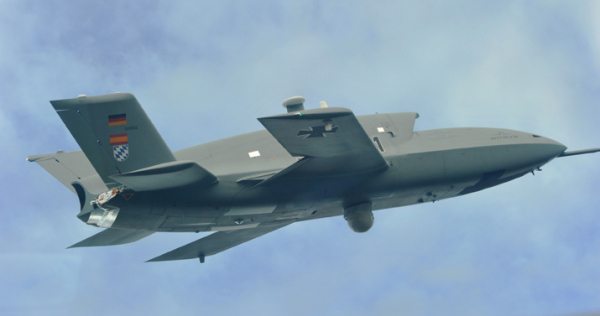LE BOURGET, France: Cassidian looks back over what is now 10 years of test flight experience with its Barracuda UAS (Unmanned Aerial System) demonstrator, a time in which the company gathered unique know-how. Barracuda forms one of the elements of Cassidian’s comprehensive UAS capabilities, which make the company the European leader in this high-tech segment.
“With this unique unmanned demonstrator in Europe, Cassidian is in a position to forge ahead with technological development in unmanned aerial systems,” explains Rolf Wirtz, head of Cassidian’s Mission Systems unit and one of the initiators of the Barracuda programme. “This company-owned test platform has many advantages, not least the unrestricted access to all hardware and software components,” emphasises Wirtz.
- Unique European unmanned aerial system
- Unrestricted access to all system data
- Cassidian is the European leader in unmanned aerial systems
Barracuda allows Cassidian to explore all of the key questions of unmanned flight. This also includes the development of the TCAS collision avoidance system for UAS and various aspects of automation. Today’s research activities focus mainly on two points: network centric operations and the integration of unmanned aerial systems into controlled airspace. Since the development of the demonstrator began in 2003, Barracuda has completed more than 540 ground tests and 13 flight tests. And the results from Barracuda testing are directly incorporated into the development of future UAS by Cassidian.
The Barracuda demonstrator is over eight metres long, has a wingspan of more than seven metres and a maximum take-off weight of around three tonnes. It is propelled by a jet turbine from Pratt & Whitney Canada, which delivers 14 kN thrust, and operates entirely autonomously during the test flights, only being monitored for flight safety purposes. The unmanned aerial vehicle’s structure consists entirely of carbon-fibre composites (CFC). Apart from the landing gear, Barracuda is an innovative “electrical airborne system” that, in contrast to conventional aircraft, dispenses with hydraulic components and uses electro-mechanical actuators instead.
Barracuda offers an operating radius of up to 200 km, a maximum flight speed of Mach 0.6, and its test instrumentation can weigh up to 300 kg. All test data is transmitted in near real time to the ground control station where it is immediately available to the flight test engineers for evaluation and analysis.
To be able to test the greatest possible diversity of systems and flight profiles, Barracuda uses a modular design and can be flexibly configured. It thus provides the best possible test environment to gather fundamental knowledge for operationally mature UAS products of the next generation. The open and modular structure of its avionic system allows a large number of different sensors and radio data transmission solutions to be integrated into the demonstrator. It is also possible to include electro-optical and infrared sensors, laser target designators, detectors to locate radio-magnetic signals (Emitter Locator System – ELS) and also advanced synthetic aperture radar (SAR) systems, which can be integrated into the Barracuda’s payload bay on the multisensor principle.
In May 2006, Barracuda took off for its maiden flight in Murcia, Spain. Since 2009, the flight tests have been carried out from the Canadian Goose Bay military airport. In this context, Barracuda has been used for flights to test the Bundeswehr’s unmanned flight procedures as part of the research and development programme “Agile UAV in Network Centric Environment” by the German Federal Office of Bundeswehr Equipment, Information Technology and In-Service Support (BAAINBw). Further campaigns are already being planned.
Cassidian, the defence division of EADS, is a worldwide leader in defence and security solutions. The company delivers advanced defence systems along the whole action chain from sensors through command & control systems to combat aircraft and unmanned air systems. In the area of security, Cassidian provides customers worldwide with border surveillance systems, cyber security solutions and secure communications. In 2012, Cassidian – with around 23,000 employees – achieved revenues of € 5.7 billion.










